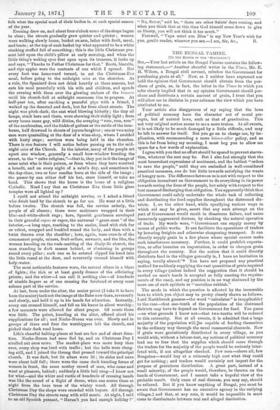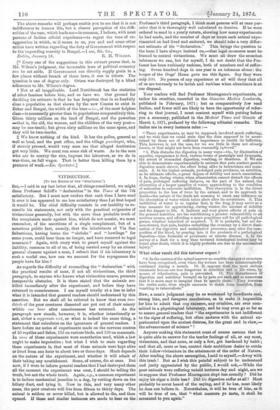THE BENGAL FAMINE.
(To THE EDITOR OF TRH "SPECTATOR:1
Sin,—Your last article on the Bengal Famine contains the follow- ing statement,—" Another cheerful writer in the Times, Mr. R.
H. Wilson, a Bengal civil servant, rebukes the Government for purchasing grain at all." Now, as I neither have expressed nor hold the opinion that Government should abstain from the pur- chase of grain, as, in fact, the letter in the Times to which you refer clearly implied that in my opinion Government should pur- chase and distribute a certain amount of grain, I trust that you will allow me to disclaim in your columns the view which you have attributed to me.
Your article also disapproves of my saying that the laws of political economy have the character not of moral pre- cepts, but of natural laws, such as that of gravitation. This not very original notion seems to me a mere truism. At all events, it is not likely to be much damaged by a little ridicule, and may be left to answer for itself. But you go on to charge me, by im- plication, with recommending a mere laissez-aller policy, and as this is far from being my meaning, I must beg you to allow me apace for a few words of explanation.
I agree with you that no effort should be spared to prevent starva- tion, whatever the cost may be. But I also feel strongly that the most benevolent expressions of sentiment, and the boldest "orders to save the people," until they are embodied in well-considered practical measures, can do but little towards satisfying the wants of hungry men. The difference between us is not with respect to the obligation incumbent on Government to do everything in its power towards saving the lives of the people, but solely with respect to the best means of discharging that obligation. You apparently think that Government could safely undertake the whole task of collecting and distributing the food supplies throughout the distressed dis- tricts. I, on the other • hand, while specifying various ways in which aid may be given, assert that any such attempt on the part of Government would result in disastrous failure, and cause immensely aggravated distress, by checking the natural operation of trade. My words were, "Government can supply money by means of public works. It can facilitate the operations of traders by lowering freights and otherwise cheapening transport. It can directly supply grain in a few places where special causes make such interference necessary. Further, it could prohibit exporta- tion, or offer bounties on importation, in order to cheapen grain throughout the country. But the notion that it could directly distribute food in the villages generally is, I have no hesitation in saying, totally absurd."* You have not proposed any practical method for suddenly supplying the vast quantities of grain required in every village (unless indeed the suggestion that it should be carried on men's heads is accepted as fully meeting the require- ments of the case), and my position is in no way shattered by the mere use of such epithets as " merciless rubbish."
The mode in which the question is affected by the inexorable laws to which you object may be pretty clearly shown as follows.
Lord Northbrook guesses—the word "calculates" is inapplicable{ to the case—that one-tenth of the population of the distressed districts may have to depend on Government for food. You guess —on what grounds I know not—that two-tenths will be reduced to this extremity. But at all events, it is admitted that a large majority of the population will be capable of feeding themselves in the ordinary way through the usual commercial channels. Now if grain were gratuitously distributed in every village, as you would wish, without a labour-test, my notions of political economy lead me to fear that the supplies which should come through the traders for the majority of the people would be seriously inter- fered with, if not altogether checked. Few men—above all, few Bengalees—would buy at a ruinously high cost what they could get for nothing ; and traders would certainly not import for the purpose of gratuitous distribution. A great part, instead of a small minority, of the people would, therefore, be thrown on the bands of Government, and I cannot take a hopeful view of the probable result. Only cases of real distress, you may say, should be relieved. But if you know anything of Bengal, you must be aware that Government has no executive agency in the outlying villages4 and that, at any rate, it would be impossible in most cases to discriminate between real and alleged destitution. The above remarks will perhaps enable you to see that it is not indifference to human life, but a clearer perception of the diffi- culties of the case, which leads me—in common, I believe, with most persons of Indian official experience—to regret the tone of ex- aggeration in which, as it seems to us, you and and some other critics have written regarding the duty of Government with respect to the impending scarcity in Bengal.—I am, Sir, Scc.,
[. Every one of the suggestions in this extract proves that, in Mr. Wilson's judgment, the inexorable laws of political economy can be set aside. If Government can directly supply grain in a few places without breach of those laws, it can in others. The question is one of degree only. Orissa was destroyed by a blind adherence to Mr. Wilson's dogma.
f Not at all inapplicable. Lord Northbrook has the statistics of other famines before him, and so have we. Our ground for doubling his estimate is that he has forgotten that in so fearfully close a population as that shown by the new Census to exist in Behar and Bengal, the width of the base—i.e., of the most helpless class—is necessarily greater than in populations comparatively thin. Given thirty millions on the land of Bengal, and the powerless —that is, the old, the women, and the children of the very poor— may be one-tenth; but given sixty millions on the same space, and they will be two-tenths.
We know nothing of the kind. It has the police, general as well as local, and the post office, and the village punchaynt, who, if sternly pressed, would very soon see that alleged destitution got very little. We must run some risk of waste. As to the men who are to convey the rice, impress the labourers, as we do in war-time, on full wages. That is better than killing them by a pretence of work.—En. Spectator.]



































 Previous page
Previous page